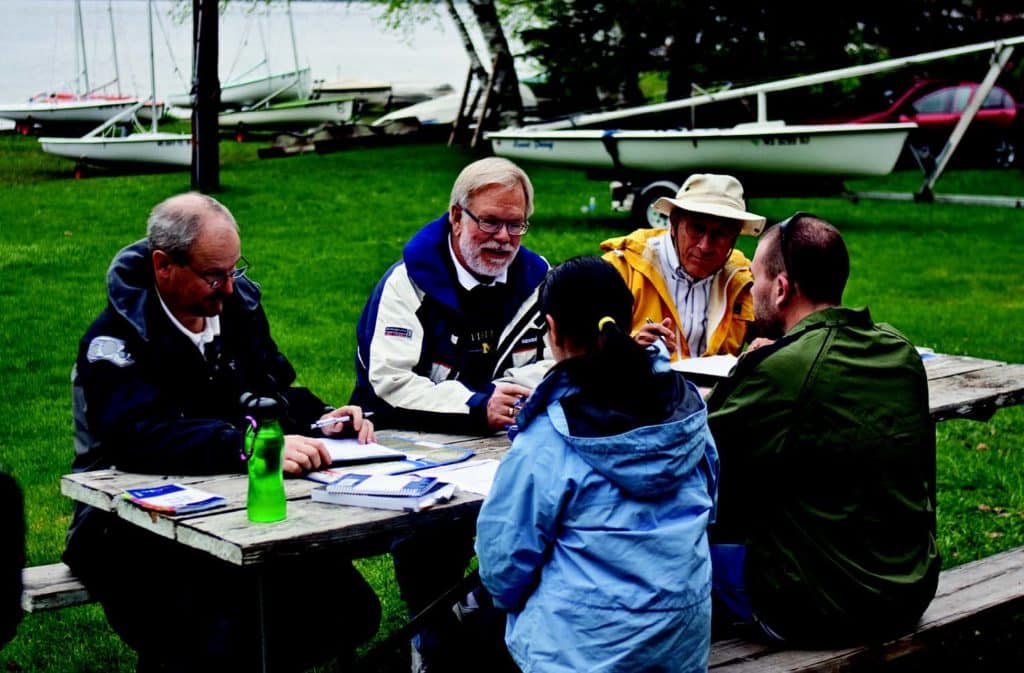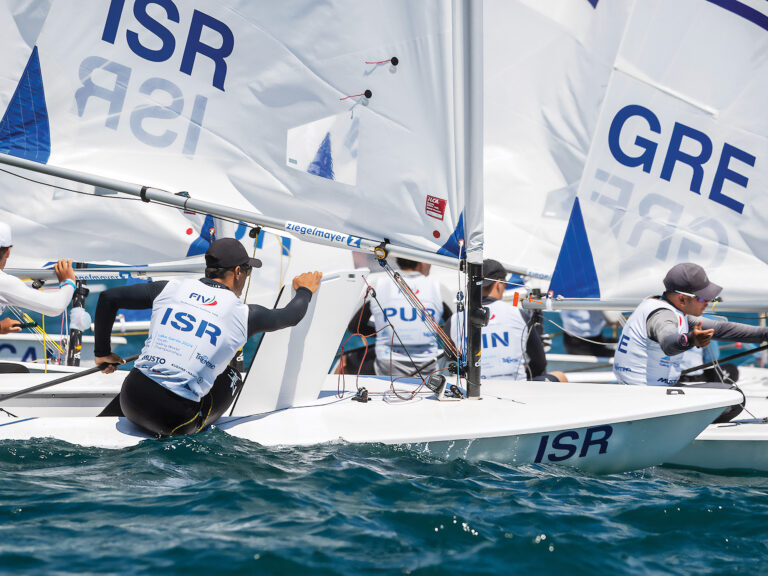
Improve Your Odds in a Protest Hearing
I’ve received a number of questions recently about what, if anything, you can do after you have lost a protest that you believe you should’ve won. This month, I’ll describe what steps the rules allow you to take.
First, take a deep breath and wait a few minutes to let any negative emotions that may have built up subside. Then, try to analyze why you lost. It may help to discuss the outcome with a friend who knows the rules well and has no interest in your protest.
You can lose a protest for one of four reasons:
- You didn’t follow the rules that govern the procedure for making a protest and your protest was determined to be invalid.
- Your protest was valid, but you simply broke a rule.
- One or more crucial facts found by the protest committee didn’t, in your opinion, reflect what actually happened.
- You believe that the protest committee didn’t correctly interpret the rules.
If you lost for the first reason, chalk your loss up to experience and resolve not to make the same mistake again. If you decide that you did indeed break a rule, analyze why that happened. If the problem was with boathandling, crew work, or information handling on your boat, brainstorm the problem with your crew and try to work out better systems that will avoid a repeat transgression. And don’t forget to apologize to the protestee.
If you lost because a fact found doesn’t reflect your view of the incident, then, without delay, start talking to anyone who might’ve seen the incident and who might be able to provide testimony agreeing with your view. Put your crew to work and check all avenues. Speak with other competitors and any spectators, reporters, race committee members, or judges who might’ve witnessed the incident. Check with anyone who might’ve taken photos or made a video of the incident. If you uncover “significant new evidence” within 24 hours of the time you were informed of the decision by the protest committee, then you’re permitted to request that the hearing be reopened to consider your new evidence (Rule 66).
If you can’t find new evidence, if the protest committee doesn’t judge the evidence you do find to be “significant,” or if the hearing is reopened but the facts found aren’t changed in the reopened hearing, then you’ve reached the end of the line. There’s nothing more to do but accept the outcome. You cannot base an appeal on a claim that the facts found by the protest committee aren’t an accurate reflection of what actually happened (Rule 70.1).
If you believe that the protest committee misinterpreted the rules, then write out your argument, reasoning carefully from the actual words of the relevant rules and citing any ISAF cases or US SAILING appeals that support your case. Deliver your written argument along with a request to reopen the hearing to the protest committee as soon as you finish it, but no later than 24 hours after the time you received the protest committee’s decision (Rule 66).
If the protest committee doesn’t agree to reopen the hearing—Rule 66 says only that the protest committee “may” reopen a hearing—or if it reopens the hearing but sticks by its interpretation of the rules despite your argument, then you still have a bit of hope—you can appeal. Before you undertake an appeal, you should realize that appeals generally take a few months to work their way through the system. There’s usually a fee required, and you’ll be saddling yourself with many hours assembling the required paperwork, writing out your arguments, and rebutting the position papers submitted by your opponents and the protest committee.
There are procedural rules for appeals, just as there are for protests and requests for the reopening of a hearing. These are found in Rules 65.2, 70, and 71 and in the rules in Appendix F. To appeal, you must have the protest committee’s decision in writing. The protest committee is obligated by Rule 65.2 to give you its written decision only if you request it “in writing within seven days of being informed of the [protest committee’s] decision.”
Once the written decision is in your hands, you have 15 days to “send a dated appeal to the appropriate appeals committee” (Rules F1 and F2.1). You must also send: (1) any required fee, (2) a copy of the protest committee’s written decision, including any diagram prepared by or endorsed by the protest committee, (3) the written protest(s), (4) the notice of race, sailing instructions and any other conditions governing the race, and any changes to them, (5) the names and addresses of the protest committee chairman and all parties to the hearing, and (6) any additional relevant documents and correspondence. The items on this list need not necessarily be sent with the original appeal, but they must be sent “as soon as possible thereafter” if they are available to you (Rule F2.2). All parties and the protest committee are permitted to comment on your appeal, and you, in turn, are permitted to comment on their findings provided you do so within 15 days of receiving them (Rule F6). What’s more, in the United States, there are usually two levels of appeal, first to the “association appeals committee” in your region and second to the US SAILING Appeals Committee (Rule F1). Now you’re beginning to see what I mean by “many hours of paperwork!”
I recently received some questions from the chairman of the protest committee at the Portage YC. For more than 40 years, this Michigan club has had a great tradition—every skipper who enters a boat in its regular season races takes a turn serving on the race and protest committees. (Of course, a skipper doesn’t serve on the protest committee if he’s an interested party—i.e., when a protest involves the class in which he normally races.) This means that the protest committee’s rules knowledge varies significantly from week to week, and, occasionally, the protest committee simply makes the wrong decision. To provide for a quick appeal when a competitor thinks the protest committee has made a mistake, PYC has established its own club appeals committee, and its sailing instructions provide that protest decisions may be appealed to that committee.
The chairman noticed that the racing rules require that all appeals be sent to the association appeals committee and that sailing instructions are not permitted to change that requirement (Rules F1.1 and 86.1(b)). He asks whether he can write a sailing instruction to allow the process he wishes to use.
There’s a way! The key isn’t to use the word “appeal.” ISAF and US SAILING want to assure that event organizers do not impair competitors’ right to appeal, and for that reason they don’t allow sailing instructions to change any rule that mention appeals. However, as we’ve noted, Rule 66 does permit a protest committee to reopen a hearing when “it decides that it may have made a significant error, or when significant new evidence becomes available within a reasonable time.” Below is a sailing instruction that will have the effect that PYC wants and that does not tamper in the least with the appeal process spelled out in the rulebook.
“The Portage Yacht Club protest committee consists of a senior protest committee and subcommittees appointed for each race. A party to a hearing that believes that a subcommittee has made an error may, within 15 days of receiving the written decision of the subcommittee, ask the protest committee to reopen the hearing. In this case, the senior protest committee will consider the request. This changes Rule 66.”
The last two sentences of this sailing instruction are needed because Rule 66 requires that, if possible, the protest committee for a reopened hearing shall have the same members as the committee that originally heard the protest. However, unlike the rules involving appeals, Rule 66 is a rule that the sailing instructions may change (see Rule 86.1(b)).
E-mail for Dick Rose may be sent to rules@sailingworld.com.









